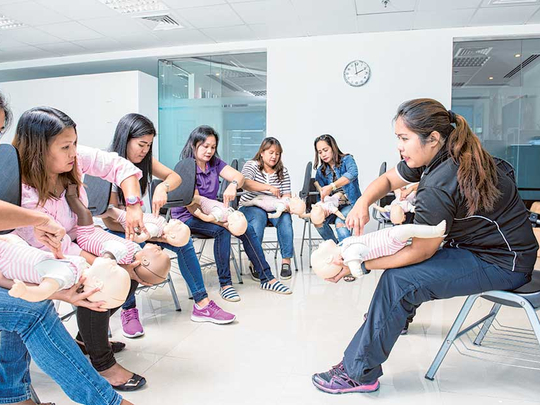
Abu Dhabi: Household emergencies involving children can occur at any time. From burns, falls, and choking to the danger of electrical shocks, there are any number of unexpected occurrences that can injure a child and if there is only a nanny or housemaid present at the time, it is critical that she be aware of the correct remedial procedures until help arrives.
A housemaid or nanny trained in first aid is an invaluable asset in cases of medical emergencies to a family that employs her services. As reported by Gulf News earlier, a study by a Zayed University professor in 2014 that covered 250 Emirati families found that 93 per cent of them had maids, and that well-off households employed one nanny per child.
A 2011 study by Dubai’s education sector regulator, the Knowledge and Human Development Authority (KHDA), revealed that 94 per cent of 23,851 Emirati families surveyed had nannies or maids.
Expatriate families, too, need childcare support, especially in cases where both parents are earning members. Among the 144,630 expatriate families surveyed by the KHDA, five per cent had nannies.
With such a prevalence of housemaids and nannies for children, it is crucial for a housemaid or a nanny to know the basics of first aid. Gulf News spoke to experts, parents and first aid training firms to understand the importance of training child minders at home so they can immediately and correctly attend to situations that can potentially injure a child while they call for professional help.
Annie Browne, a former emergency room nurse from the United Kingdom who heads up a health and safety training and consultancy firm, Health and Safety Solutions, in Abu Dhabi, has focused much of her efforts this year on training maids and nannies.
“Even before emergency response arrives, a caregiver can do much to save a dependant’s life,” Browne said.
Doctors, too, advise that it is prudent to have first aid certification for caregivers who are often left alone with children. Not only will this reduce the level of treatment that is required if children get injuries, but it can also help prevent many injuries among young children.
According to Browne, “Less than five per cent of the nannies and maids we see know the most basic skills, such as administering cardiopulmonary resuscitation (CPR) when someone stops breathing, or abdominal thrusts to prevent choking. So, since March, we have trained over 700 maids and nannies, and we hope that this will mean that many more lives are now safer,” she added.
Dr Dolly Habbal, a clinical psychologist at Universal Hospital in Abu Dhabi, believes that babysitting a child is not just about reading a book or changing diapers. Instead, all babysitters, nannies and childcare professionals should be trained in first aid in order to be able to deal with any emergencies that occur, she said
“It is ignorance on the part of parents not to insist on first aid knowledge when selecting a nanny or employing a babysitter. Without this knowledge, the childcare professional will not be prepared to deal with the injuries and falls that are inevitable around small children” Dr Habbal said.
“Just the other day, I came across a case of a toddler who followed his elder sibling into the pool and nearly drowned. The nanny froze on the spot without jumping into action. In such a situation, those trained in first aid would know how to assess the risk and take prompt measures, including cardiopulmonary resuscitation,” she added.
According to Dr Habbal, the cost of training nannies in essential first aid skills is not prohibitive in the UAE.
“These sessions cost up to Dh600, and what is that compared to the precious life of a child? All caregivers, after all, should know how to respond correctly to injuries and sudden emergencies like choking, drowning, burns, falls, bleeds and even fractures,” the psychologist said.
She advised that first aid knowledge be a must for carers who take care of children aged upto six years.
“Beyond this age, a child understands consequences and can be held responsible for certain actions. But before this, children are prone to injuries and not tending to these hurts and bruises and risks correctly could even put the child’s life at risk,” she said.
Though many parents Gulf News spoke to said they think first aid training is an essential skill for nannies to have, few actually check to see if the woman is trained in first aid.
“When I hired a nanny, I checked to see that she had some experience handling babies, and that I could communicate with her. But I did not consider how important it was for her to know what to do in case an emergency arises at home,” Hana Al Zurba, a doctor and mother-of-three from Jordan, told Gulf News.
Zaina Shedib, a media executive from Germany, also said her nanny was not trained in first aid response.
“At present, I am not working and I am almost always around to take care of my two daughters. But before I go back to work next year, I might actually considering having our nanny trained in first aid,” she added.
Fortunately, first aid training courses are widely available in the UAE, and many are geared towards training caregivers.
A basic first aid course at most training firms lasts from four to six hours and costs between Dh400 and Dh600. It covers skills such as CPR, car safety and other knowledge that can prevent accidents and falls at home. It also teaches attendees how to assess the danger a patient is in, and how to know when to call an ambulance.
“I would think that most agencies offering nanny services should ensure that their staff is trained. That said, I would not mind getting my nanny enrolled in one myself,” Al Zurba said.












